Rocket Arena preview: "We wanted to build rockets with personality"
The rocket-loving shooter from Final Strike Games is coming in July
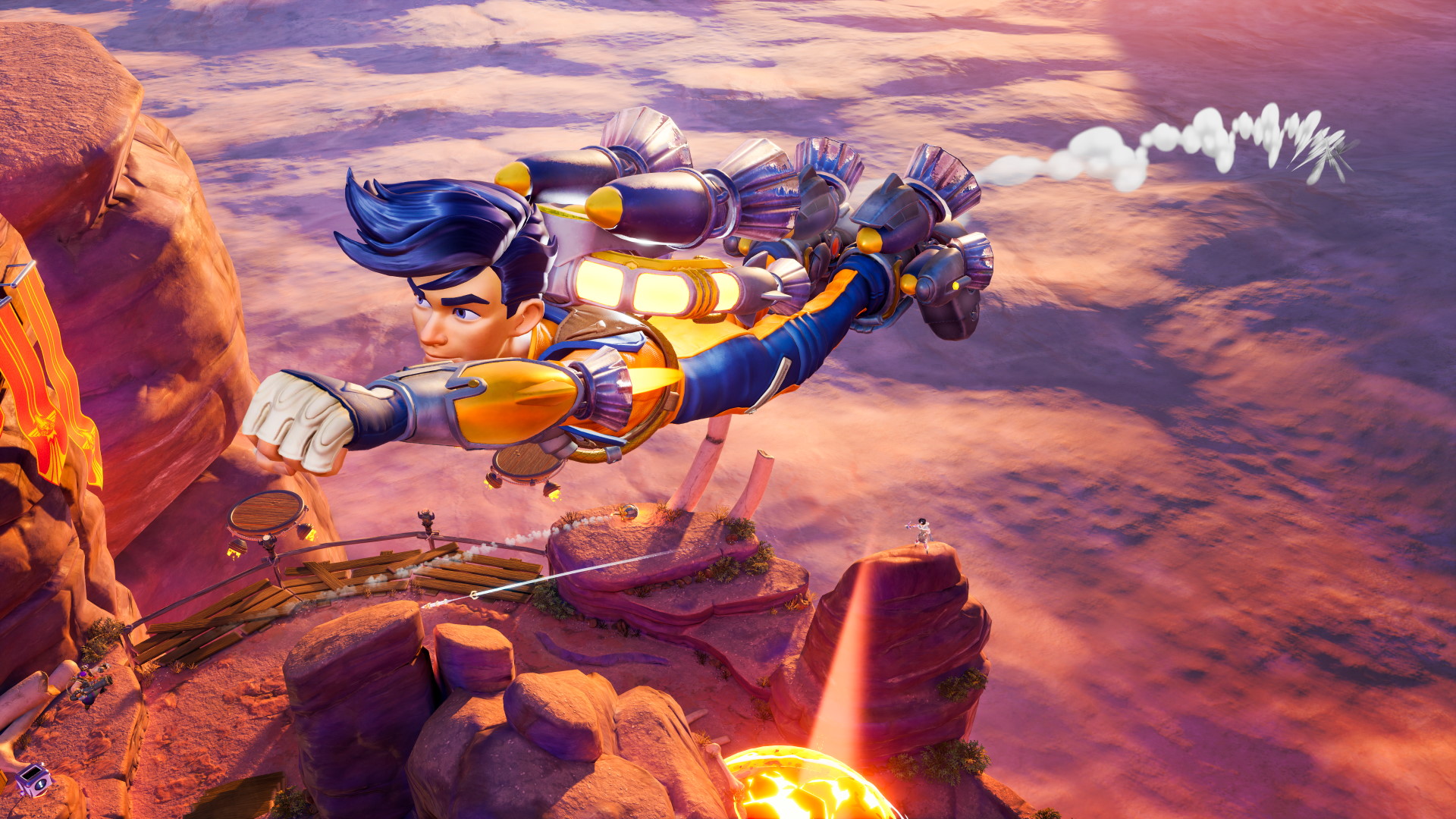
The most fun I had in Rocket Arena was blasting myself along the outer rim of an arena with nothing but explosions keeping me afloat. I was playing a game mode in which two teams fight over control of a treasure chest that drip feeds coins to whichever side possesses it. Holding onto the chest when the round resets will give you a bonus, making it a fight for possession right to the end. I had the chest as the countdown ticked down, but the enemy team was bearing down on me with a hellstorm of rockets and I wouldn't last much longer.
I leapt over the side of the stage. I aimed at the castle wall just below my feet and started firing – one rocket, two rockets, three rockets. As in the sacred rocket-jumping tradition set forth from the days of Quake, the rockets blasted me upward, keeping me just inside of the map's limits and perfectly covered from the attacks of my ground-dwelling opponents. The timer elapsed, I scored the bonus, and I felt like a rocket scientist.
Lift off
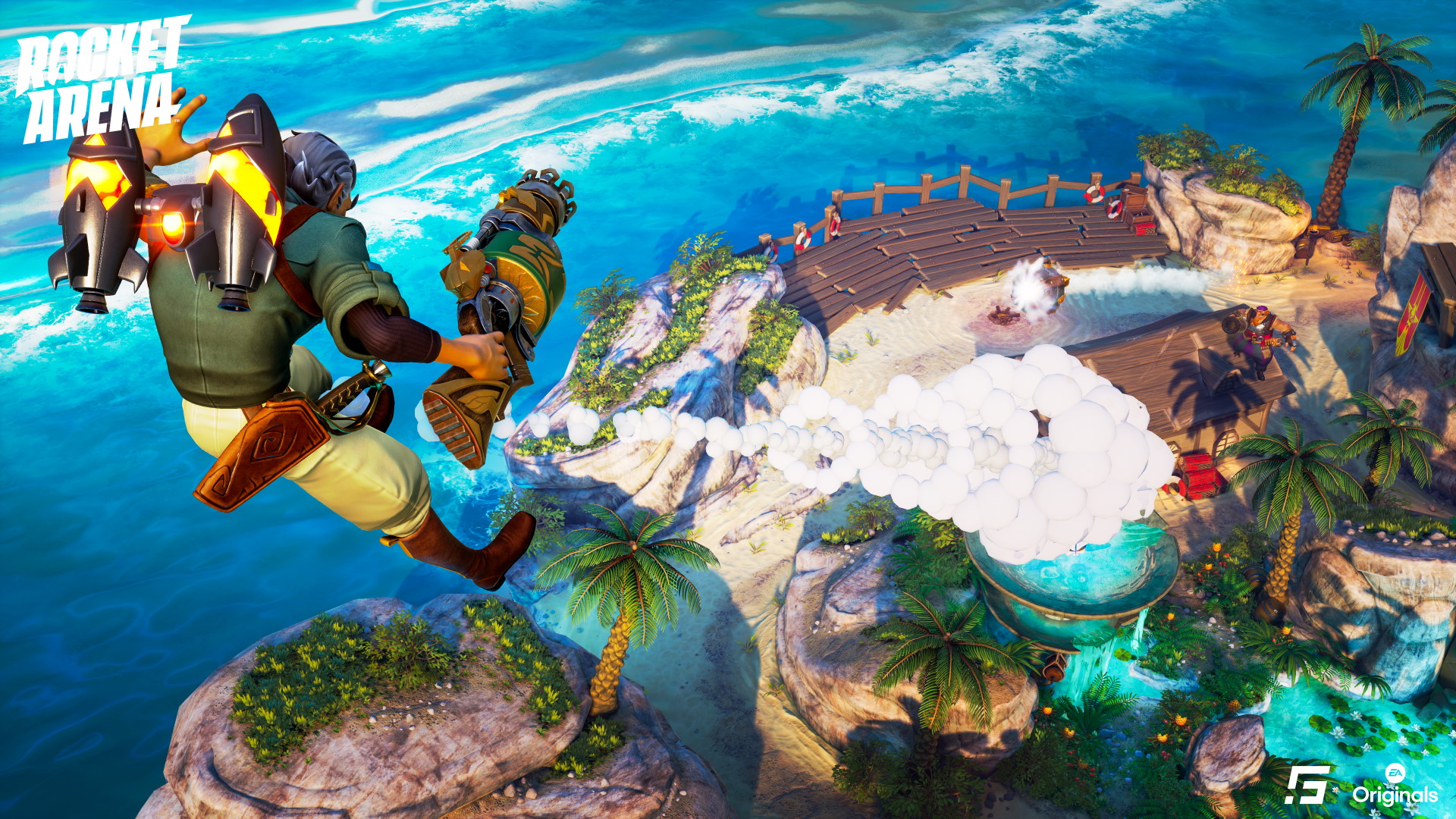
Let me be clear: that was a perfect preview strategy, the kind of harebrained scheme that would probably only work when playing against other people who are brand new to a pre-release game. But that's part of the charm of Rocket Arena – it gets you thinking in ways that shooters typically don't. Everything in this game starts with rockets. That includes the development of the game itself, Final Strike CEO Kevin Franklin tells me.
"We had a pillar really early on, that we wanted to build rockets with personality," Franklin says. "So we have some rockets that arc, like the cannonball rocket. We have rockets that ricochet. We have rockets that bounce. This was all of our goal to make really interesting gameplay. Before we could build the characters, we had to build a really strong rocket that had a lot of personality."
Different characters in Rocket Arena have different kinds of rockets – Blastbeard, the jolly pirate I was playing when I made my grand escape, is the one who shoots cannonballs – but all their munitions send people flying. You can use that to rocket jump around the map, or you can put your rockets to work in their more traditional application and fire them at enemies. There's no insta-gibbing in Rocket Arena, though. There isn't even a health bar.
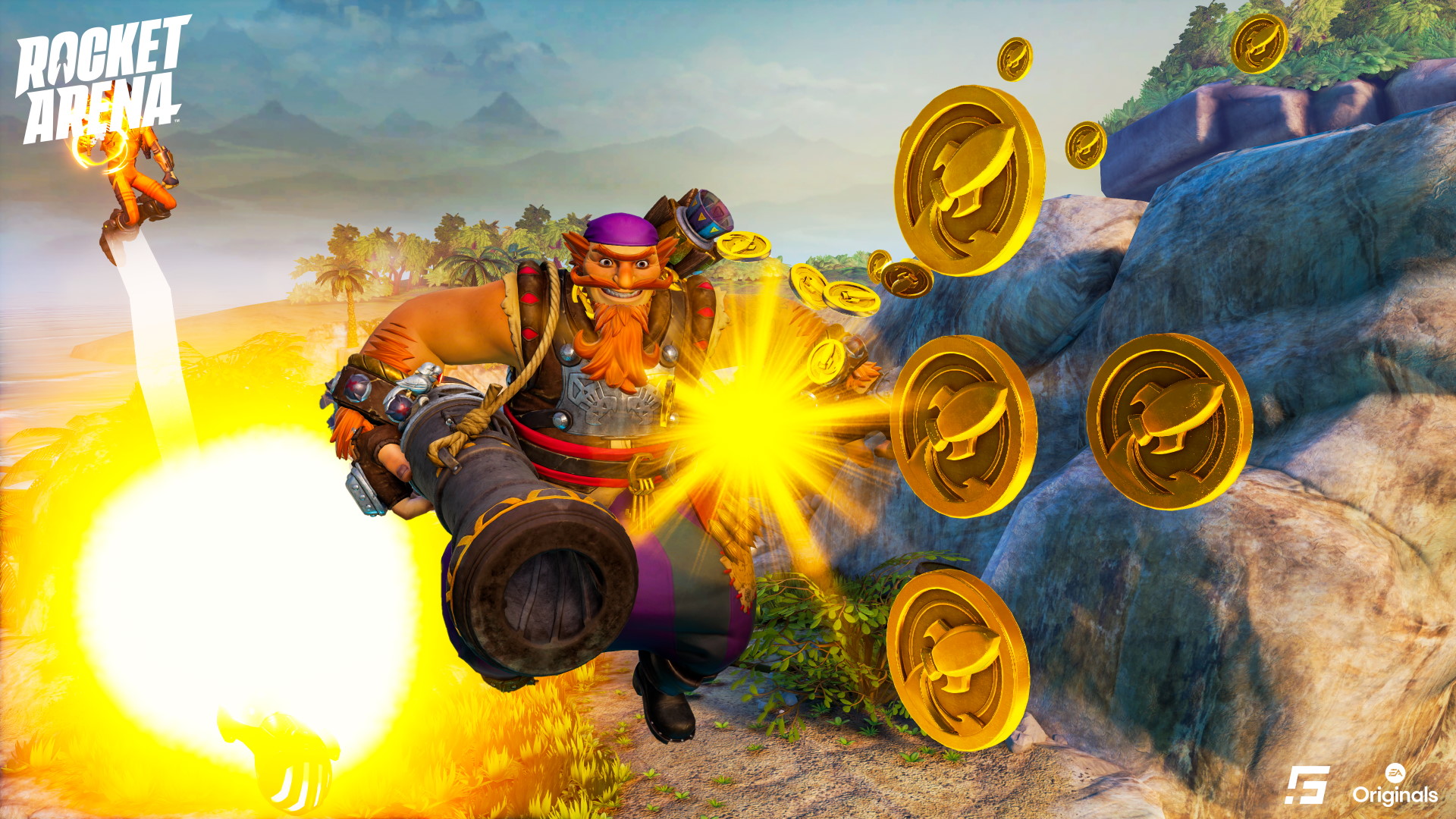
"A core group of us, we're from [the Halo 5 multiplayer team at 343 Industries]. But we got together and knew we wanted to make something completely different," Franklin says. "We started our prototype with rockets only in a greybox form. And we made it so the rockets didn't kill you, they kind of blasted you around the arena. And that really became the nucleus, or the core thing that we built, and had a lot of fun with."
When you catch an enemy with a rocket – whether head on or with splash damage – you'll build their blast meter. This determines how far they'll fly the next time they get hit. If they're sitting pretty at the center of the stage, they still have a decent chance to survive a hit even if their meter's high. Eventually they'll top out and the next rocket will send them ricocheting around the map and out of bounds, racking up points for the opposing team before they fly back to the arena ready to fight again.
Sign up to the GamesRadar+ Newsletter
Weekly digests, tales from the communities you love, and more
Perfect dodge
The second most fun I had playing Rocket Arena was dodging other people's rockets. Pressing a button will make your character briefly juke out of the way of incoming rockets, but then it goes on cooldown – and you probably already have another dozen rockets headed your way. Plus, if you time your dodge just right, you can break out of the stun inflicted by mounting damage, potentially saving yourself from a knock-out at the last second. This makes choosing when and where to use your dodge a constant tactical triage.
"We really wanted to make players have ways to interact with airborne rockets. So if everything's a projectile, you always get a chance to know who fired it at you," Franklin continues. "If you see that cannonball coming through the air, you know it was Blastbeard that fired it. But you also get a chance to dodge them with our air dodge feature. So that was a new thing we wanted to build in a new shooter. We've never done it before, but it was a lot of careful balancing and experimentation to get that just right."
Rocket Arena used to be a first-person game, but it went third-person last year in large part to get that dodge feeling just right. "We found that it was a lot easier for players to time their dodge in third person," Franklin explains. "But we didn't want to make any compromises on the feel of the game, or how it felt to aim rockets or get air shots, or play on a controller. So it was a big challenge, but it was well worth it once we dug into it [...] We also found that the characters, with all the personality they have, were quite a bit more expressive in third person. So it was good to see that."
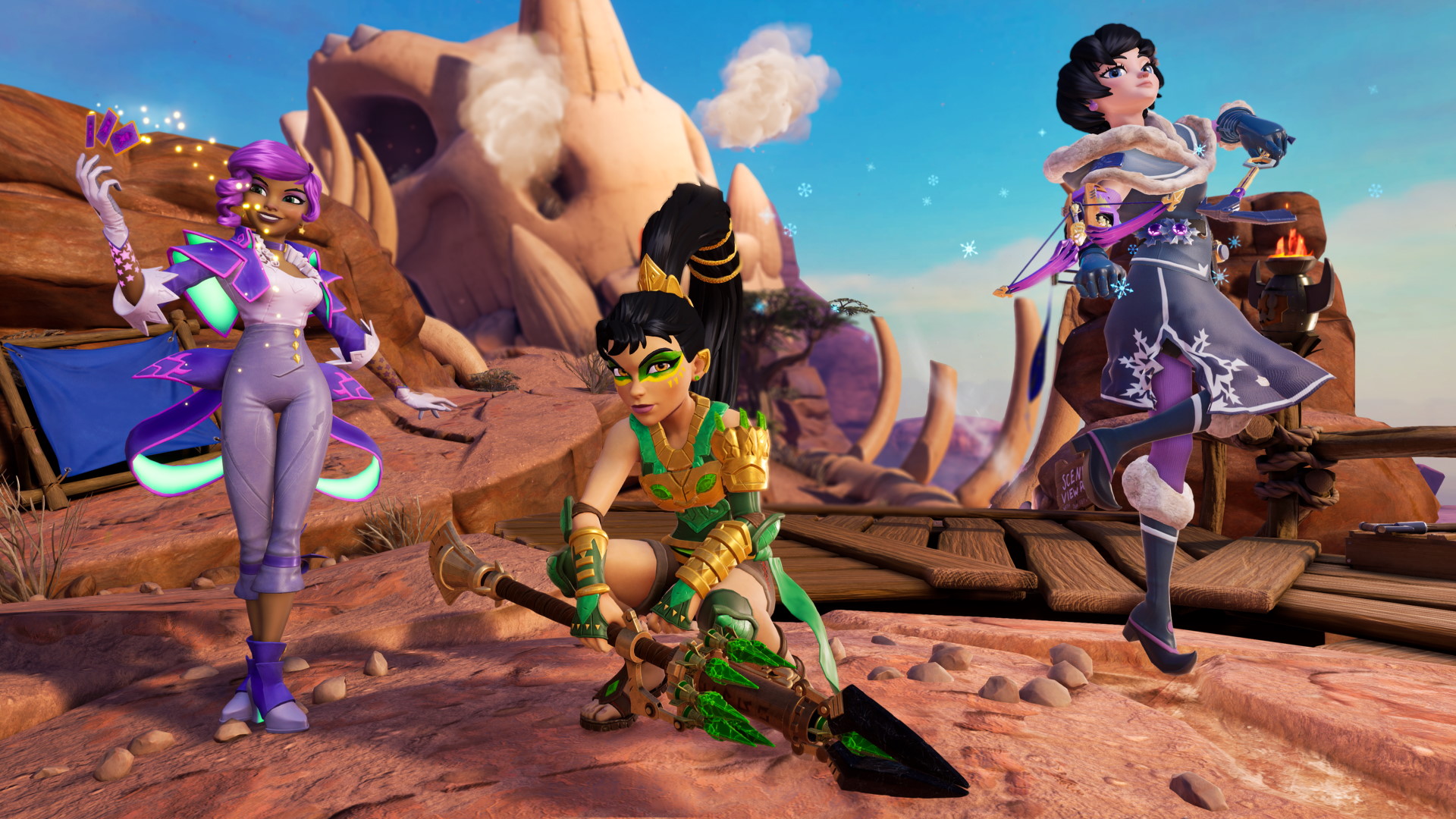
It was a big shift to make in the middle of development, and it wasn't the only one for Final Strike Games. Rocket Arena was originally going to be a free-to-play title when it was being developed in partnership with Nexon. Now it's part of the EA Originals label, and it's launching on July 14 on PC, PS4, and Xbox One with two paid editions – a base level for $29.99, and the $39.99 Mythic Edition that comes with extra goodies.
Rocket Arena will also include in-game microtransactions for certain character outfits and other high-end cosmetics, though Franklin assures me that you won't be able to buy anything that affects the gameplay mechanics themselves; you'll either own those outright as part of buying the game, like the 10 starting characters and maps, or unlock them as you play, like the ability-tweaking Artifacts. You don't see many games going from free-to-play to paid these days – the other direction is more common – but Franklin seems happy to have made the changeover. "I mean, it was quite a different game then, and we've built so much more content in the meantime that we really wanted to evolve the game, and make a great offering for players," he says.
Live fire
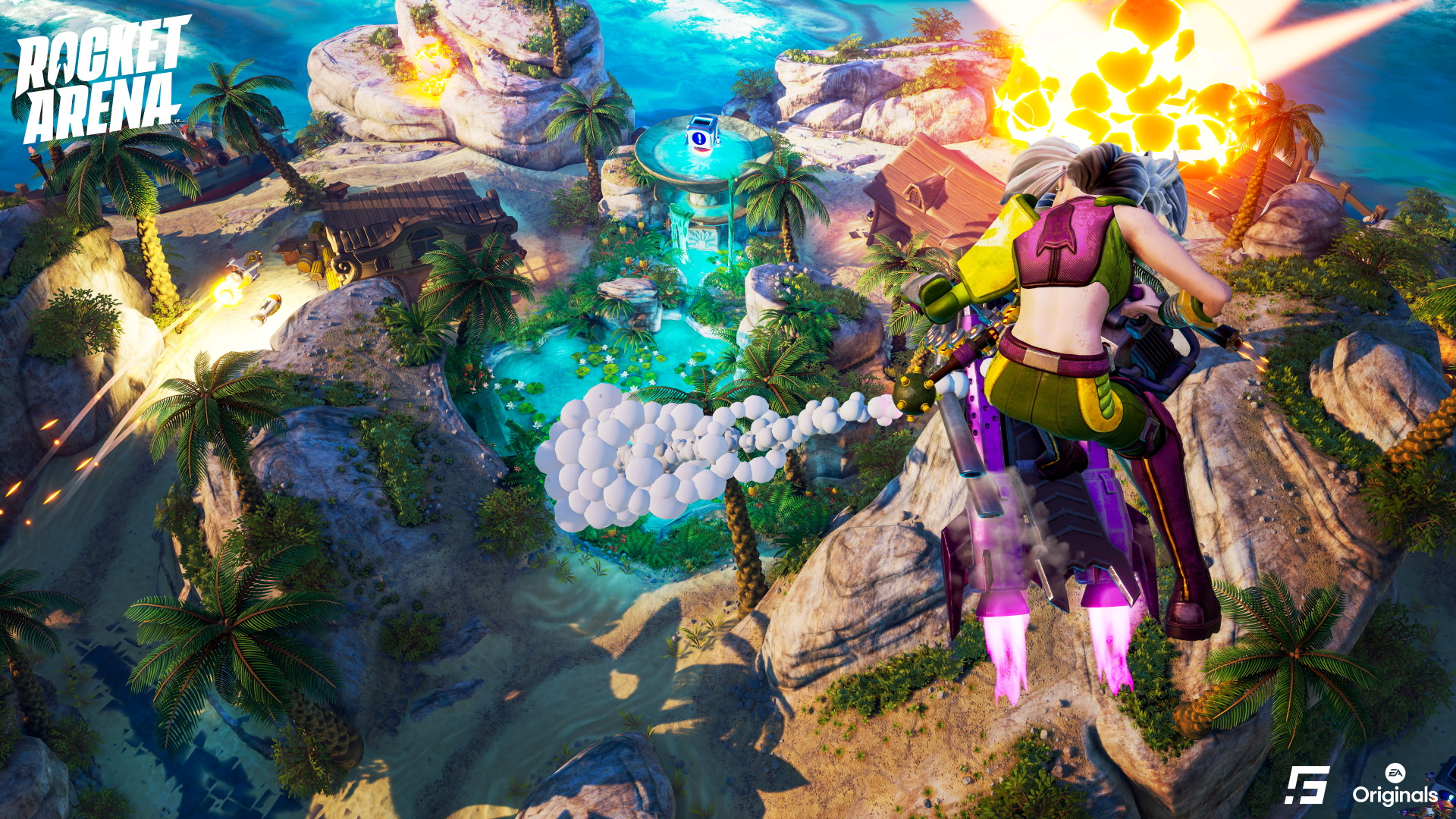
After launch, Final Strike Games is planning to keep the rocket fires burning with regular updates: expect new characters, maps, items, and Artifacts to roll into Rocket Arena as it kicks off seasons worth of themed content and special events. These events will also give you the chance to learn more about Rocket Arena's setting and characters: both the colorful world of Crater and its cartoonish inhabitants were created with the assistance of writer Len Uhley, best known for penning episodes of everything from DuckTales to Ben 10.
Final Strike Games wants to keep Rocket Arena growing and surprising players for years. But at its most basic level, it will always have one thing keeping it honest: rockets. And to be honest with you - and Franklin - I'd always sucked at rocket jumping.
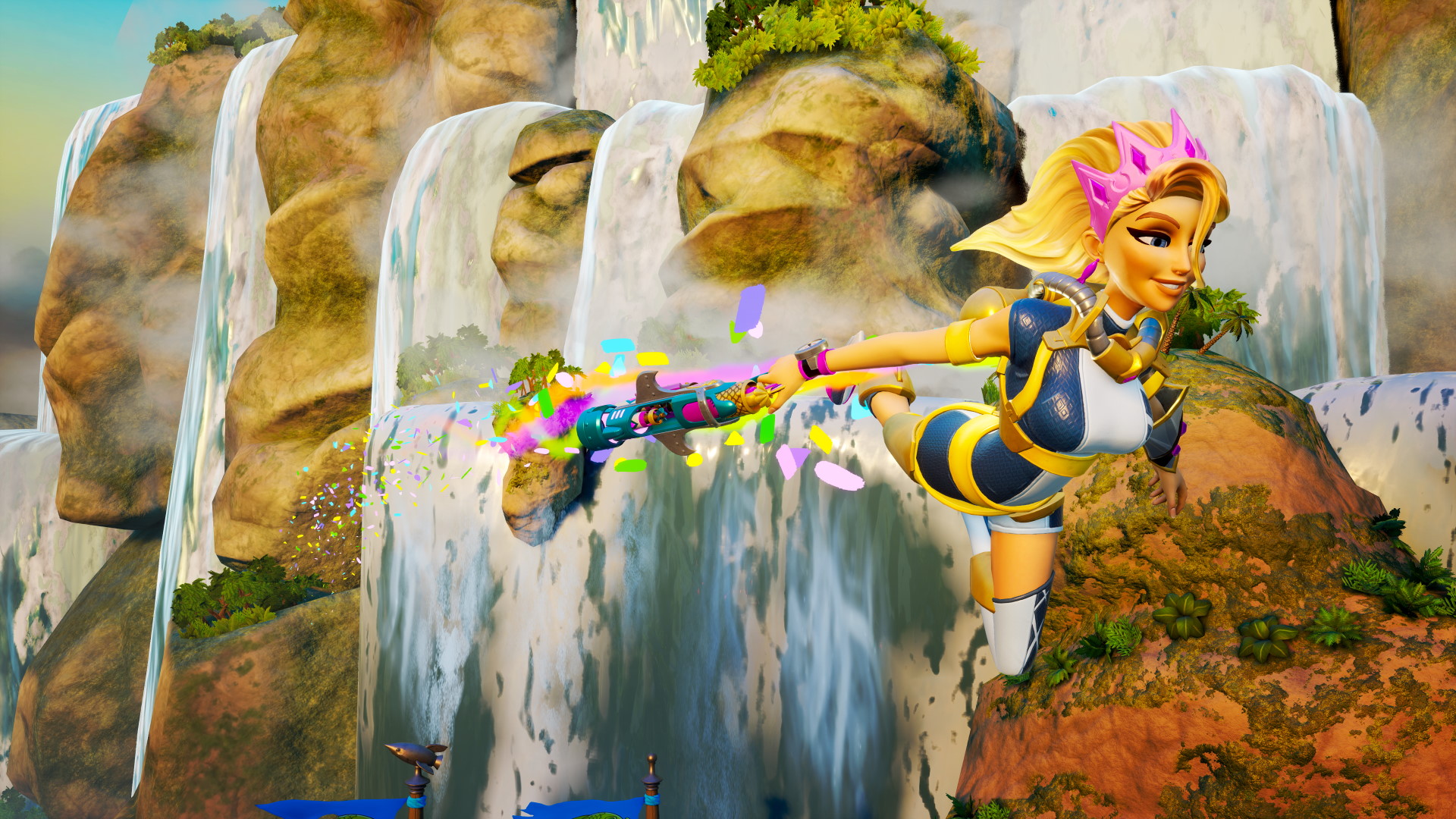
Yes, this is to the great shame of somebody whose favorite shooter heroes include The Soldier and Pharah. I was always pretty good at landing rockets on other people, but on myself? In a way that launches me somewhere I want to go and doesn't just blow me up? I could rarely work it out. Rocket Arena finally made it happen for me, and it was a great feeling.
"The last thing that I've been really impressed with, which just blew me away watching new players play the game, is how quickly players can pick up rocket jumping and rocket climbing, and how there's a really deep skill curve there to up your competitive game by learning the different routes in the map [....] A lot of time went into making sure it worked vertically, horizontally, directionally. We got feedback from all sorts of different players of competitive shooters, on how they thought rocket jumps should work."
See what else you should get excited for this year and beyond in our guide to the upcoming games of 2020.
I got a BA in journalism from Central Michigan University - though the best education I received there was from CM Life, its student-run newspaper. Long before that, I started pursuing my degree in video games by bugging my older brother to let me play Zelda on the Super Nintendo. I've previously been a news intern for GameSpot, a news writer for CVG, and now I'm a staff writer here at GamesRadar.



